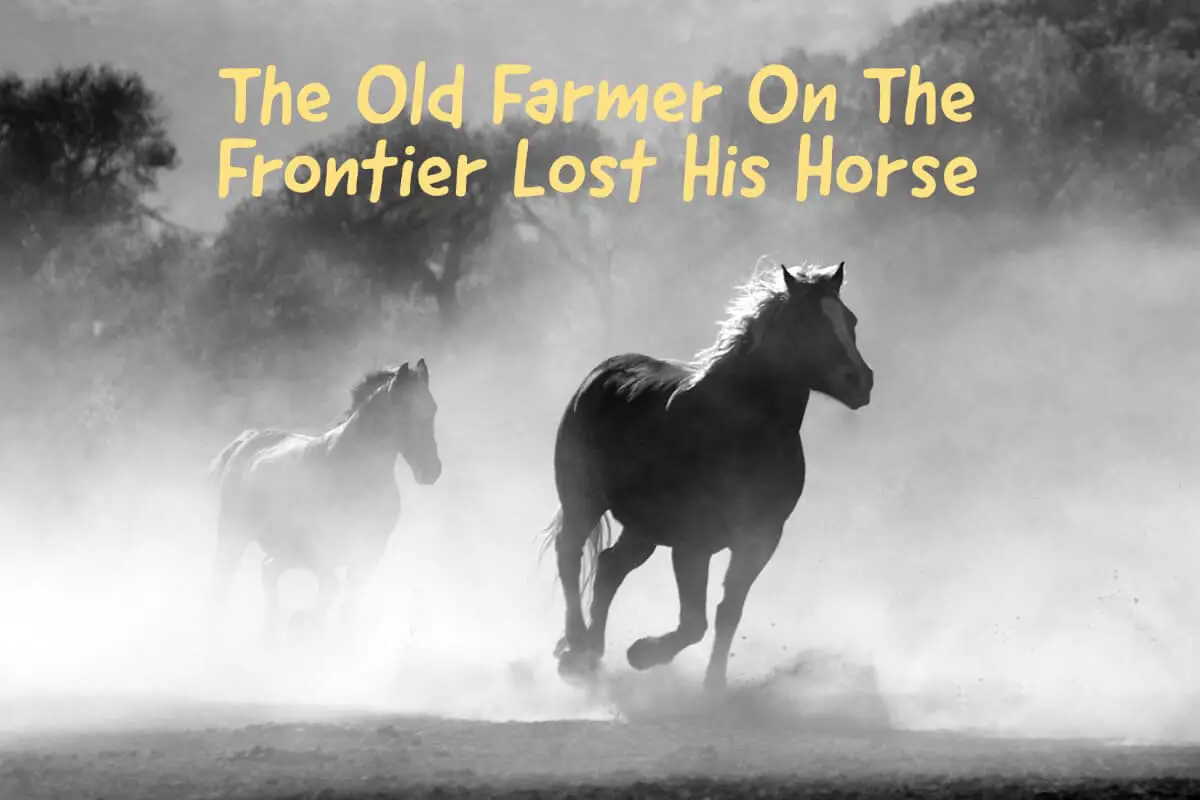Translated From Chinese By Dr. Arthur William Hummel
An Old Chinese Story From More Than 2,000 years ago.
Written in the Book of Huai Nan-Tzu who died in 122 B.C.
An Old Chinese Story – The Farmer and His Lost Horse
An old farmer who lived on the northern frontier of China, on the border of Mongolia, lost his horse. It had wandered into the desert into no-man’s land. When his neighbors heard of it they came to his house to commiserate with him. But all he would say was “You can you never tell it may turn out to be a good thing after all.”
Some months later, that horse came back, bringing with him a much finer horse. Thereupon all the farmer’s neighbors came in to congratulate on his good luck. But again all that the farmer would say was “You never can tell, it may not be such a good thing after all.”
Since the family now had an extra good horse, the farmer’s son took a fancy for riding the new one. Before long, however, the son fell from his mount and broke his leg. Once again, the neighbors flocked in to express their sympathy for the farmer’s bad luck. Even so, all that the farmer would say was, “You never can tell, this may turn out to be a good thing, after all.”
Sure enough, before a year had gone by fierce horsemen from the desert came plundering across the frontier. There came such numbers that the authorities drafted for military service every able-bodied young man who could draw a bow or march in battle. Nine out of ten young men in that region lost their lives. Only the fact that the son was lame and the father was old preserved the family from harm.
Who Was the Chinese Scholar Huai Nan Zi, also known as Liu An?
Huai Nan Zi, also known as Liu An, was a prominent Daoist philosopher, Chinese nobleman, and scholar. He was also known as Master Huai Nan. He was born in Jiangsu Province, China, and is known to have died in 122 B.C.
In the 3rd and 4th Centuries, many of Huai Nan Zi’s writings and thoughts resurged in importance. In fact, for over a 700 years period, many of Huai Nan Zi’s Daoist thoughts and writings were considered important; he was considered one of the most important Daoist writers.
Huai Nan Zi or Lan An came from a prominent Chinese family. He was the grandson of Ganzu, the founder of the Western Han Dynasty, and was a cousin of the reigning Chinese emperor.
As part of his royal lineage, he inherited a kinship and was granted the fief of Huai Nan. The fief or area he ruled is in modern-day north-central Anhui Province, China.
Under his rule, Huai Nan Zi was a patron of the arts and sciences. Many talented people would flock to his court. It was also under his patronage that the classic Huai Nan Zi, also known as Huai Nan Hong Lie, was written.
Huai Nan Zi was implicated in a plot against the Imperial Chinese throne, to avoid punishment by death, he committed suicide in 122 B.C.
Related Questions
What is Eminent Chinese Of The Ch’ing (Qing) Period (1943), by Dr. Arthur W. Hummel?
The editor of the book Eminent Chinese of the Ch’ing Period is my grandfather, Dr. Arthur W. Hummel. But he did not work alone but had the help of two very accomplished Chinese scholars, Dr. Chao Ying Fang and Dr. Tu Lein Che Fang. Together, as a team, they spent over 9 years and thousands of hours to compile this very important work about eminent people during the Chinese Qing (Ch’ing) dynasty. This book continues to be used and remains an important Chinese scholarly work. There is also an online version available.
You can read more about this and Dr. Arthur William Hummel by reading our blog Eminent Chinese Of The Ch’ing (Qing) Period (1943), Arthur W. Hummel by clicking here.
What Are Some Chinese Proverbs About Life and Living?
My grandparents Arthur and Ruth Hummel lived in China in the early 1900s. During this time they started to collect and translate Chinese proverbs. We have over 175 of their Chinese proverbs categorize by the subjects they set for them.
You can discover more Chinese proverbs by reading our blog Over 175 Inspirational Chinese Proverbs On Life And Living by clicking here.

